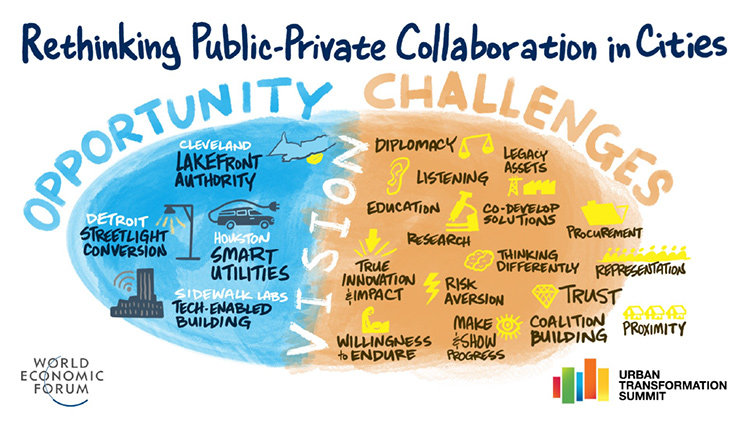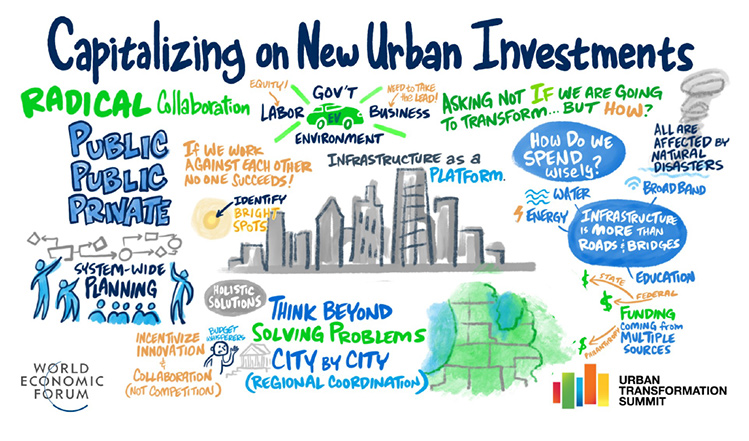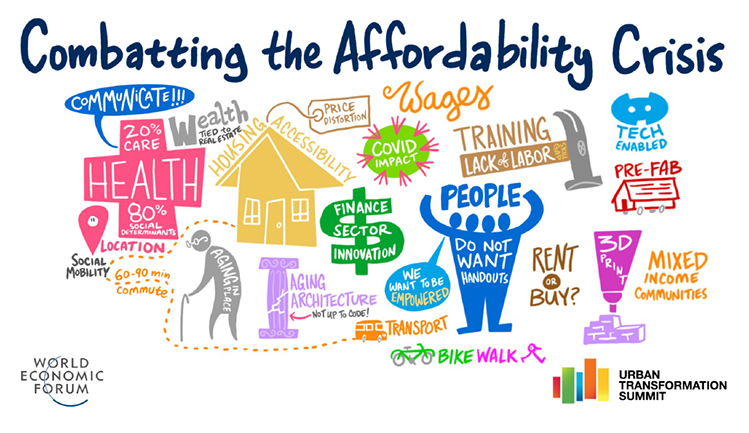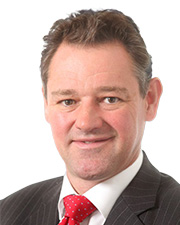Shaping the cities of tomorrow – key insights from the World Economic Forum’s Urban Transformation Summit

Between 10-12 October, Avison Young’s Chief Economist, Nick Axford, attended the WEF Urban Transformation Summit in Detroit. The three-day meeting bought together leaders from the private sector, different levels of government and major NGOs to discuss how best to drive public-private collaboration in the transformation of urban areas that require investment and regeneration.
While there were many highlights, here Nick shares his views on several overarching themes that ran through the summit.
Radical collaboration

A session on Capitalising on New Urban Investments emphasised the need for a regional approach – with demands for “radical collaboration” between partners genuinely committed to driving real transformational change in cities rather than delivering one-off projects. This was echoed in the session on Rethinking Public-Private Collaboration in Cities where there was consensus around the need for true community representation and coalitions that take a holistic approach to problem-solving.
Calls for a “systems approach” were also heard in the sessions on Delivering on the Promise of New Infrastructure and Harnessing the Power of Innovation Districts. In both cases there was recognition of the need to balance public vs “capitalist” return on investment, with a focus on creating opportunity rather than simply wealth.

Creating inclusive spaces
Similar themes emerged when Nick sat on the panel discussing Revitalising Post-Industrial Cities, which focussed on the need to deliver a “sense of place” that appeals to all stakeholders in the urban environment. The private sector’s need to generate a viable return must be recognised and respected, but not at the expense of the wider good of the community. Developing tools to monitor well-being, impact and social value is critical to allow such considerations to be balanced with conventional calculations of “ROI”.
The need for an integrated approach cropped up again in the debate around Combatting the Affordability Crisis. The residential market for “full economic participants” (those who are able to rent or buy accommodation on a purely commercial basis) is totally different to the affordable housing market, which addresses problems that can’t be solved by any one company or organisation acting independently. We need to focus on delivering a range of outcomes rather than products and recognise that the need for affordable housing is integrally linked to a wider range of issues including health, economic opportunity and equality which won’t be solved by “bricks & mortar” alone – no matter how it is priced.

High time for low carbon
The climate crisis and the ongoing impact of the COVID pandemic were recurrent themes running through the summit. The session on Accelerating Sustainable Construction in Cities highlighted the role that technology is playing in developing new materials, but also the potential for some old ones. Use of mass timber is accelerating rapidly, and it’s encouraging to see that carbon is starting to be seen as an asset. Carbon accounting and conventional cost metrics are starting to converge around the same solutions: lowest carbon approaches are often easier, requiring less labour, and are thus less expensive than higher carbon alternatives. This process will be accelerated as both legislation and the sophistication of carbon accounting gathers pace.
Cities that work for workers
The summit ended with a session Nick participated in on Adapting to Hybrid Models of Work. Companies are keen to attract employees back to the office, and there is a lot they can do to improve their corporate workspaces to help achieve this. But it’s not just about the office space – it’s about the wider environment in which it is located. People have a choice about where to work, so cities need to focus on being places where people want to be, which in some cases has become more challenging post-COVID. People want to work in attractive, vibrant, liveable places that deliver a positive overall experience. Cities are perfectly placed to do this but have no automatic right to be the destination of choice for knowledge work and need to consciously focus on delivering the right environment for companies and their employees.
Overall, the collaborative spirit that pervaded the event was noticeable, alongside the desire to understand and tackle the challenges faced by the new generation of public-private partnerships looking to drive urban transformation – an issue which Avison Young is working directly with the WEF to help address.
The keys to success in building a successful coalition were aptly summarised as being:
- Vision and ambition
- Collaboration
- Listening and responsiveness
Contact Nick Axford to find out more about our work with the WEF and how public-private partnerships can transform urban areas.

